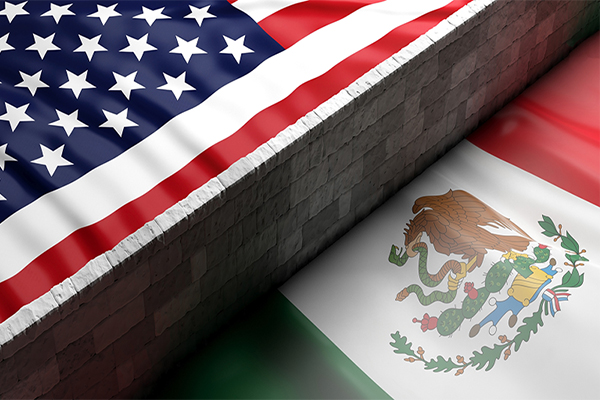Trump’s 5% Tariffs On All Goods Imported From Mexico Does Not Sit Well With U.S. Businesses

President Trump’s threat to impose across-the-board tariffs on Mexico is stirring widespread opposition and concern among U.S. business groups who say they could have major negative impacts on supply chains and trade activity.
Tariffs and the Ongoing Trade War
The topic of tariffs and the ongoing trade war has primarily involved the United States and China.
But Mexico is now in the mix, too, albeit not formally yet, based on Tweets and a statement issued by President Trump yesterday.
On June 10th, the United States will impose a 5% Tariff on all goods coming into our Country from Mexico, until such time as illegal migrants coming through Mexico, and into our Country, STOP. The Tariff will gradually increase until the Illegal Immigration problem is remedied,..
— Donald J. Trump (@realDonaldTrump) May 30, 2019
In short, Trump said that effective June 10, the U.S. will impose a 5% tariff on all goods imported from Mexico.
And he explained that this effort stems from the “ongoing illegal immigration crisis” at the Southern border.
“If the illegal immigration crisis is alleviated through effective actions taken by Mexico, to be determined in our sole discretion and judgment, the Tariffs will be removed,” Trump said.
If the crisis persists, however, the Tariffs will be raised to 10% on July 1, 2019. Similarly, if Mexico has not taken action to dramatically reduce or eliminate the number of illegal aliens crossing its territory into the United States, Tariffs will be increased to 15% on August 1, 2019, to 20% on September 1, 2019, and to 25% on October 1, 2019.
The President added that tariffs will permanently remain at the 25% level unless and until Mexico substantially stops the illegal flow of aliens coming through its territory.
And he also stated that if Mexico fails to act, tariffs will remain at a high level, with Mexican-based companies potentially moving back to the U.S. to make their products and goods, and companies that relocate to the U.S. not subject to tariffs or be otherwise impacted.
Trump further mentioned that aside from immigration being the primary impetus for these planned tariffs that; “over the years, Mexico has made massive amounts of money in its dealing with the United States, and this includes the tremendous number of jobs leaving the country.”
White House trade advisor Peter Navarro told CNBC (see the video above) that Trump’s threat of new tariffs on Mexico is tied to the president’s declaration of a national emergency at the border and came in response to Mexico’s “export” of “illegal aliens.”
Navarro also pushed back on the notion that the tariffs were intended to bring more manufacturing jobs to the United States from Mexico, saying that the tariffs were “not at all” related to that goal.
Tariff Impact on Supply Chains and Trade Activity
Should these tariffs come to fruition, they could have major negative impacts on supply chain and trade activity as well as the overall economy, according to various industry stakeholders.
“These tariffs will be paid for by American businesses and consumers and will do nothing to address the real problem at the Southern border,” said Neil Bradley, executive VP and chief policy officer for the United States Chamber of Commerce, said in a statement.
“It is quite likely they will only make the problem worse and come at a steep cost to American families and businesses. At 5% that is $17 billion in new taxes imposed on an annual basis, and at 25% it is $86 billion in new taxes. There is no doubt that will have a negative ripple effect through our economy, which is why we are urging the President not to move forward with this plan to impose tariffs on Mexico. There are other solutions the Administration and Congress can be pursuing to address the problem at the Southern border…to address these migratory flows. But imposing tariffs will make all that we need to do all that much harder, weakening our economy at the same time.”
John Murphy, senior vice president, International Affairs, U.S. Chamber of Commerce, who spearheads the Chamber’s cross-border efforts, said on the call that across the U.S. farmers, ranchers, workers, and businesses are already feeling the impact of recent U.S.-China tariff actions. “The last thing we need to do is ratchet up self-inflicted harm to the U.S. economy,” he said.
“Mexico has recently become the number one trading partner of the United States. It has become the top export partner for a whole host of specific agricultural commodities. The danger here of further trade tension is real.”
That sentiment was shared by David French, senior vice president for the National Retail Federation, who said that the growing tariff bill paid by U.S. businesses and consumers is adding up and will raise the cost of living for American families.
“Forcing Americans to pay more for produce, electronics, auto parts, and clothes isn’t the answer to the nation’s immigration challenges, and this certainly won’t help move USMCA forward,” French said.
Analysis from Chris Rogers, research director for global trade intelligence firm Panjiva, observed that this development comes just as resolution on passing USMCA had been reached, in which the governments of the U.S., Canada, and Mexico reached an agreement to remove bilateral tariffs relating to the U.S. section 232 investigation of the steel and aluminum industries.
“It does mark a change in rhetoric from President Trump who had previously only threatened to close the border,” he said.
Automotive Manufacturing Supply Chains
As reported by Politico, Trump’s announcement poses its most direct threat to integrated supply chains that depend on the free flow of goods across the border, especially the automotive industry.
According to data compiled by Deutsche Bank, around two-thirds of U.S. imports from Mexico, which totaled $371.9 billion last year, were “related-party” trade, meaning companies bringing in parts and products as part of their supply chain.
The U.S. imported $124 billion in auto products from Mexico in 2018, which includes new and used passenger vehicles; medium, heavy and other trucks; and auto parts, according to the International Trade Administration.
On any given day, more than $452 million worth of auto parts are traded in either direction across the U.S.-Mexico border, said Ann Wilson, senior vice president of the Motor and Equipment Manufacturers Association.
Business groups in Washington quickly slammed Trump’s decision, which White House officials indicated came after a haphazard internal process and against the advice of some of the president’s freer trade-oriented advisers.
“Intertwining difficult trade, tariff, and immigration issues create a Molotov cocktail of policy, and America’s manufacturing workers should not be forced to suffer because of the failure to fix our immigration system,” National Association of Manufacturers President and CEO Jay Timmons said in a prepared statement.
“These proposed tariffs would have devastating consequences on manufacturers in America and on American consumers.” The Business Roundtable said unilateral tariffs on Mexico would be a “grave error.”
Related Article: With Tariffs in Flux Digital Inventory Technology Might Be the Solution to Inflated Inventory Levels
Download Related Paper
How to Mitigate the Fallout of International Trade Relations New!
As global trade evolves further and newer tariffs come to the fore, procurement teams need to be mindful that complacency comes at high costs. Waiting to react to a policy change or delaying technology implementation can have serious implications for organizations engaging in cross-border trade. Download Now!
Article Topics
Avetta News & Resources
Compliance Risk: A Significant Impediment to the Modern Supply Chain Protecting Supply Chains Against Economic Uncertainty Supplier Classification: A Differentiator in the Modern Supply Chain Landscape New Cybersecurity Requirements Needed for Supply Chains Building End-to-End Risk Resiliency in Supply Chains Supply Chain 2030: Evolving Challenges, Opportunities and Technological Possibilities Extending ESG Best Practices Into the Supply Chain More AvettaLatest in Supply Chain
Baltimore Bridge Collapse: Impact on Freight Navigating TIm Cook Says Apple Plans to Increase Investments in Vietnam Amazon Logistics’ Growth Shakes Up Shipping Industry in 2023 Spotlight Startup: Cart.com is Reimagining Logistics Walmart and Swisslog Expand Partnership with New Texas Facility Nissan Channels Tesla With Its Latest Manufacturing Process Taking Stock of Today’s Robotics Market and What the Future Holds More Supply ChainAbout the Author














